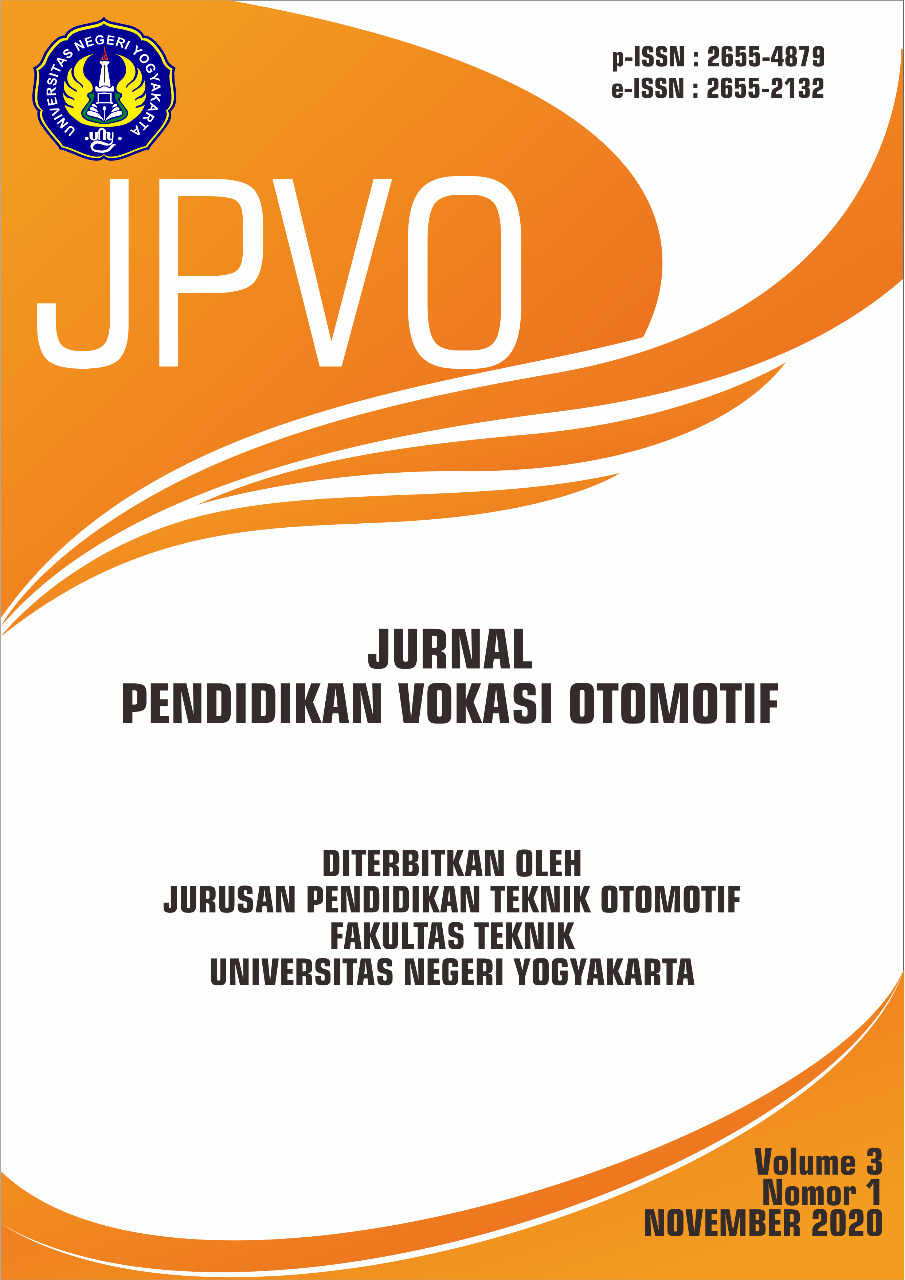IMPLEMENTASI KURIKULUM RELAKSASI DALAM PEMBELAJARAN MASA PANDEMI COVID-19 KOMPETENSI KEAHLIAN TKRO DI SMK N 2 YOGYAKARTA
DOI:
https://doi.org/10.21831/jpvo.v4i2.45590Abstract
The study aims to describe the implementation of a relaxing curriculum during the covid-19 in the competence expertise learning process at 10th grade techinical automotive Yogyakarta's Vocational High School (SMK N 2 Yogyakarta) which included the formulating aspects of the relaxation curriculum, stake holder's involvement, management performance's of the learning process, obstacles during the implementation of the relaxation curriculum and follow-up of the learning curriculum used. This is a kind of descriptive research. The research subject is teachers, students of the competition for 10th-grade technical automotive engineering, and several of stakes holder (head of technical automotive light vehicle, school committee, industry, parents of students, school supervisor and covid-19 cluster head) who have a direct interest in the implementation of learning at SMK N 2 Yogyakarta. Data of this research was collected by questionnaires, interviews, documentation, and observation. Data was analyzed by descriptive statistics. The data of the research were analyzed by using descriptive statistical techniques that focused on the central tendency of the data. Studies indicate that the general conclusion of the implementation on the relaxation curriculum to studies held by SMKN 2 Yogyakarta was carried out in good.
Keyword: implementation of relaxing curriculum, planning, management implementation, evaluation and follow-up about curriculum which used.
References
Anas, Z & Budiman, A. (2020). Evaluasi Program Pembelajaran Pekerjaan Dasar Teknik Otomotif Kelas X TKRO di SMK Negeri 1 Sedayu: Pencapaian hasil belajar siswa pada program pembelajaran PDTO. Jurnal Pendidikan Vokasi Otomotif, Volume 2 Nomor 2, hlm. 7-18.
Arikunto, S. (2013). Prosedur Penelitian. Jakarta: Rineka Cipta.
Budiman, Aviv. (2015). Implementasi Kurikulum 2013 di SMK Ma'arif Salam. Skripsi, Universitas Negeri Yogyakarta.
Erliana, H. (2021). Vocational students' perception of online learning during the covid-19 pandemic. Jurnal Pendidikan Teknologi dan Kejuruan, Vol. 27, No. 1, hlm. 58-65.
Haryana, K., dkk. (2018). Peranan program pelatihan dalam memantapkan kompetensi profesional guru SMK TKR. Jurnal Pendidikan Vokasi Otomotif, Volume 1 Nomor 1, hlm. 66-76.
Jatmoko, D. (2013). Relevansi kurikulum SMK Kompetensi Keahlian teknik kendaraan ringan terhadap kebutuhan dunia industri di Kabupaten Sleman. Jurnal Pendidikan Vokasi, 3(1), pp. 1-13.
Kemendikbud. (2020). Permen No. 719/P/2020, tentang kurikulum relaksasi/khusus/darurat.
Nurodanika, Mawarda. (2021). Implementasi Pembelajaran Daring pada Mata Pelajaran Produktif Kompetensi Keahlian Teknik Dan Bisnis Sepeda Motor Smk Piri Sleman. Skripsi, Universitas Negeri Yogyakarta.
Siyoto, S. (2015). Dasar Metodologi Penelitian. Yogyakarta: Literasi Media Publishing.
Sugiyono (2015). Metode Penelitian Pendidikan. Bandung: Alfabeta.
Sukmadinata, N. S. (2008). Metode Penelitian Pendidikan. Bandung: PT Remaja Rosdakarya.
Syarifudin, A. S. (2020). Impelementasi pembelajaran daring untuk meningkatkan mutu pendidikan sebagai dampak diterapkannya social distancing. Jurnal Pendidikan Bahasa dan Sastra Indonesia Metalingua, 5(1), pp. 31-34.
Republik Indonesia. (2003). Undang-Undang Republik Indonesia No.20 Tahun 2003 Tentang Sistem Pendidikan Nasional.
Virus Corona Hari Ini. (31 Agustus 2020). Kompas, hlm.3.
Wu, M. (2018). Creative thinking curriculum infusion for students of teachers' education program. Jurnal Pendidikan Teknologi dan Kejuruan, Vol. 24, No. 1, hlm. 1-12.
Yuswono, L.C., (2014). Profil kompetensi guru Sekolah Menengah Kejuruan Teknik Otomotif di kabupaten Sleman. Jurnal Pendidikan Teknologi dan Kejuruan, Volume 22, Nomor 2, HLM. 174-183.
Downloads
Published
How to Cite
Issue
Section
Citation Check
License
Jurnal Pendidikan Vokasi Otomotif allows readers to read, download, copy, distribute, print, search, or link to the full texts of its articles and allow readers to use them for any other lawful purpose. The journal allows the author(s) to hold the copyright without restrictions. Finally, the journal allows the author(s) to retain publishing rights without restrictions

Jurnal Pendidikan Vokasi Otomotif is licensed under a Creative Commons Attribution-ShareAlike 4.0 International License.
Based on a work at https://journal.uny.ac.id/index.php/jpvo.









